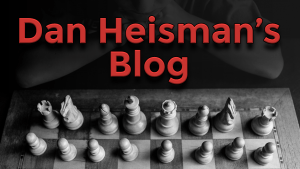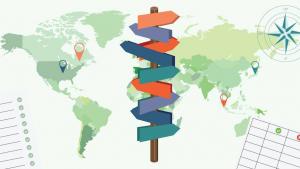A few years ago at the US Amateur Team Championship East (USATE) I saw a gentleman who was age 93 playing for one of the teams. Apparently the story was that at age 90 he was advised to take up something mentally pro-active, the idea that those who engage in those activities are less likely to develop Alzheimer's, etc. His first rating was about 900 but he kept studying and playing and by age 93 his rating was up to 1300.
This story was related to someone who asked if it were physically possible for someone to improve after their mid-30's. As I have written several times, it's one thing to say that a grandmaster who becomes strong in his early teens will peak in his mid to late 20's. It's quite another thing to extrapolate and assume that no one, no matter how late they start, and how little they know, can't improve at a much older age. For grandmasters they are already near the peak of their knowledge, so as they age they get diminishing returns on their additional knowledge, while their brain decay, while small, starts to outpace that knowledge gain by small amounts as they get into their 30's. It starts to become more apparent in the late 30's and early 40's. Kasparov and I both retired from competitive play in our early 40's (don't think this is quite analogous but it sounds good  ).
).
But if you are a complete beginner, or even someone who just never took the game seriously, unlike a GM you are nowhere near your possible maximum chess strength. So at any age once you start to play and study seriously, you can improve dramatically. That's not to say that if you start in your mid-30's you will become a GM, but if you are 1200 then, assuming you have the massive time needed and have the other requisite abilities, you can become quite a strong player, theoretically.
At the start of today's show I made the point that although the show is called "Q&A with Coach Heisman", questions about chess issues other than how to improve at chess are both welcome and make the show more interesting. To that effect I received two similar questions:
- Who helped you the most in your chess career?" I answered Bob Schumsky, NM Rich Pariseau, NM Rich Lunenfeld, Expert Don Latzel, Expert Jerry Kolker, IM Donald Byrne, Steve Wexler, Ken Boehm, Jim Joachim, Lester Shelton, and Frank Gavlak. I left out Robin Buzby, but I should have included him. The latter part of that group were my chess buddies, who studied and went to tournaments with me.
- "Who helped you most as a chess author?" My first publisher was Bobby Dudley of Chess Enterprises, here in Pennsylvania. I wrote Elements of Positional Evaluation in 1974 on a typewriter but it was not published til I tugged on Bobby's arm in 1990 (no, I did not need to twist it!). Happily since then it has sold out its first three editions and, after Bobby retired, the fourth edition was tripled in size and published by Russell Enterprises, which also published Looking for Trouble and Back to Basics: Tactics. Besides Russell Enterprises and Chess Enterprises, other publishers included Thinker's Press (Everyone's 2nd Chess Book), Everyman (A Guide to Chess Improvement), Chess Central (Traxler and Fried Liver/Lolli e-books) and Mongoose Press (The World's Most Instructive Amateur Game Book, The Improving Chess Thinker, and the 2nd edition of The Improving Annotator). At Chess Cafe, Russell Enterprises published Novice Nook, which was edited by Mark Donlan, who now is the publisher. I have to thank all my editors - without them my articles and books would not be as readable. A special call out to a non-chess editor: Richard Saad, who was our long-time tech editor at Intermetrics. Rich helped me write about 1,000,000 words for our proposals, and in the process made me a much better writer - thanks, Rich!
I was asked about the World Championship venue controversy. I am certainly not the leading expert on this issue, but my understanding is that FIDE promised India it would be able to host the next World Championship event after losing out on a previous bid. That, of course, circumvents the normal bidding process and simultaneously gives home field advantage to Anand over Carlsen. Needless to say, the Carlsen camp was understandably upset about this turn of affairs. To say it's the first time and World Championship candidate was unhappy with FIDE would be about the furthest thing from the truth - if you list everyone who ever played for a FIDE championship that probably is a closer list to those that have been unhappy at one time or another...

.
The most straightforward question was "Is it 'a NM'" or 'an NM'?" I think pronouncing the letter "N" sounds like "enn", so that's a vowel sound and thus "an NM" seems correct to me. I don't think too many would howl at the written version of "a NM" but I think using "an" is correct, especially when spoken.
Someone asked if I needed more than a rating (eg a norm or a certain event win) to get my NM title. The answer is no - if you get the US Chess Federation ratings of Expert (2000 min), National Master (2200), or Senior Master (2400) by playing in 25+ games lifetime, then the associated title is permanent. For FIDE the titles of Candidate Master (CM; 2200) and FIDE Master (FM; 2300) are also rating driven. However, the most prestigious titles of IM (2400) and GM (2500) usually, but not always, require norms as well.
This led to another question of whether the higher ratings now are only due to the superior quality of modern play due to computer help, better books, etc. The answer is that while this is definitely a factor, there is also definitely inflation as well. In the early 1980's FIDE raised the IM and GM norms from 2350 to 2400 and 2450 to 2500, respectively. IMHO, It should have been raised again once or twice more since then to reflect the same level of play and exclusiveness but, for what I believe are primarily political issues, this has not been done. The USCF Rating Committee keeps close tabs on inflation issues and it's happened several times that deflation or inflation has happened and adjustments were made (usually on the bonus point limit). But there's no doubt that ratings are somewhat inflated today. Some small examples: Dr. Leroy Dubeck is in his 70's and is still a master (2200+; not floored), yet when I started playing there was so much deflation that Leroy, then in his 30's, was only rated in the 2100's, as were most of the best players in Philadelphia. There was only one active master in Philadelphia; Donald Byrne, my coach, was in the high 2400's and in the Top 10 in the US. Today that would not get him into the Top 50. In 1969-1971 Spassky was World Champion with a rating of 2690. Today that would not put him in the Top 40! There's definitely some inflation but, yes, players
are a little better today and one thing is for sure: players get better earlier due to access of computer tools (like on Chess.com!

) and lots of strong competition on the Internet, if you wish to find it.
Someone asked me if he could get to be a strong player only playing 30 minute games on the internet. That depends on the definition of "strong player" but, on the whole, if you want to learn the critical thinking skills that help you become a strong over-the-board player, you need to play lots of longer time control games. Maybe someday if all games are 30 minutes or less that might not be as important but today that's still not so. Sure, playing a ton of 30 minute games is better than not playing at all - it can be greatly helpful - but to get titles at important tournaments played at 40/2 and similar slow time controls, learning critical thinking skills is still required. Someone else on the channel added that just internet games don't get you the same experience as OTB; for example, it's more difficult to review games with your opponents and you certainly can't go out to lunch with them and discuss chess.
Another viewer asked, "What are the conditions for a Lucena"? (IMHO certainly not important knowledge for becoming a good player!). I replied that the rough way to tell a Philidor from a Lucena was that it had to be K&R&P vs. K&R and if the defending king was able to get in front of the pawn, then it heads toward Philidor (a draw), while if it can't and the offensive king (the one with the pawn) can get in front while the offensive rook "cuts off" the defending king by one rank then, if the pawn is sufficiently advanced, that gets toward Lucena (a win). I also cited the "Rule of 5" I learned from FM Matt Bengtson: If the rank of the pawn plus the number of ranks the defending king is cut off from the pawns file equals more than 5, then it's likely a win. If it's 5 or less (less than 5? - could be) then it's likely a draw. Of course, there are many other factors, but this is a good rough one. As I mentioned earlier, this type of knowledge, while vaguely helpful, is not much use to you until you get to be a very strong player. I cited GM Soltis in Studying Chess Made Easy where he says to study general endgames, not specific ones like Philidor and Lucena. He suggests that players rated under 2000 probably don't need to know more than 20 specific endgames (like K&Q vs K, K&R vs R, K&P vs K) and I concur.
A 1300 asked what he could do to improve. I said that without knowing why he is 1300 I don't know, but almost assuredly he would primarily benefit from improving
The Three Show Stoppers. I also said that pretty much everyone under 1700 plays "
Hope Chess" (makes moves without consistently checking to see if the opponent can reply with a check, capture, or threat that can be safely met on the following move; instead they wait and see if the opponent makes such a threat and
then figure out if it can be met, hoping it can - but sometimes it can't); until you do, a barrier of roughly 1700 will remain...That article on
Hope Chess was the first one I ever wrote for
Chess Cafe and it eventually led to me being asked to write the
Novice Nook column, a request for which I am forever grateful.
A viewer asked me about being nervous going into a tournament. We discussed this a while but I ended with Don't be worried about losing a game; be concerned about losing a game and not learning anything.
At one point on the show my computer seemed to freeze; it was probably only the battery on my wireless mouse going bad but to be safe I rebooted the computer and put in a new battery. This caused about a 7-minute delay in the middle of the show - for that I apologize but I did run the show over to give everyone the full 90 minutes. Unfortunately the first 30 minutes was lost for the show recording, so you can only see the last hour on replay. [PS: Apparently it was somehow saved; see NoRematch's comment below]
 ).
). .
. ) and lots of strong competition on the Internet, if you wish to find it.
) and lots of strong competition on the Internet, if you wish to find it.





